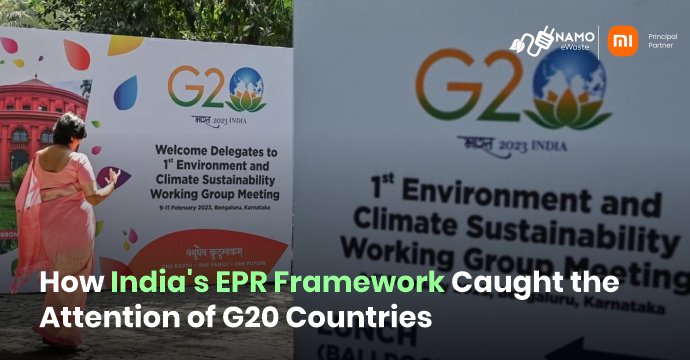India’s Extended Producer Responsibility (EPR) framework has gained significant attention from G20 countries due to its innovative approach to addressing the challenges of plastic waste and promoting a circular economy. The recent deliberations at the G20 Environment and Climate Sustainability Working Group Meeting in Gandhinagar highlighted the importance of global cooperation for an integrated circular economy[1]. Here’s a closer look at how India’s EPR framework has become a model for other countries and the key factors that have contributed to its success.
Addressing the Challenges of Plastic Waste Generation
The G20 discussions have emphasised the need for effective strategies to tackle the increasing generation of plastic waste. India’s EPR framework has been recognized as a comprehensive approach that holds producers responsible for the entire lifecycle of their products, including post-consumer waste management[1]. This approach ensures that the burden of managing plastic waste is shared among all stakeholders, leading to more sustainable and efficient waste management systems.
“The circular economy is about resource efficiency that can improve our products and services but also ensure that there is minimal environmental impact while extracting the materials. Reusing, recycling and restoring are the best ways to continue our economic activity. The EPR framework presented explained the producer’s responsibility in creating a circular economy to which the G20 countries expressed great interest and were discussed in detail,”
– Leela Nandan, Secretary Ministry, Environment, Forest and Climate Change.
Key Achievements of India’s EPR Framework
Electronic Waste Management: India’s EPR in waste management framework has led to a significant reduction in electronic waste ending up in landfills. Producers are now actively involved in collecting, dismantling, and recycling electronic products, ensuring the responsible disposal of hazardous materials.
Plastic Waste Reduction: The extension of EPR to plastic products has contributed to a substantial decrease in plastic waste littering the environment. Producers have been incentivized to design products with recyclability in mind, leading to the development of eco-friendly packaging solutions.
Boosting Circular Economy: India’s EPR framework has played a pivotal role in promoting a circular economy. The concept of product stewardship has encouraged manufacturers to design products with durability, repairability, and recyclability, reducing the overall environmental footprint.
Integration of the 9Rs Principles
To ensure the global applicability of the framework, the G20 has explored the integration of innovative concepts such as the 9Rs (Reduce, Reuse, Recycle, Recover, Redesign, Remanufacture, Repair, Refurbish, and Rethink). India’s EPR framework has already incorporated these principles, making it a valuable model for other countries looking to enhance their waste management strategies.
Establishment of a G20 Resource Efficiency and Circular Economy Industry Coalition (RECEIC)
The G20 has proposed the establishment of a Resource Efficiency and Circular Economy Industry Coalition (RECEIC) to facilitate international collaboration and knowledge sharing on circular economy initiatives. India’s EPR framework can serve as a blueprint for the RECEIC, showcasing the benefits of a comprehensive and inclusive approach to waste management.
Engagement with Informal and Regional Platforms
While several informal and regional platforms, such as the Platform to Accelerate a Circular Economy (PACE), already exist, the G20 has recognized the need for a formal mechanism dedicated to addressing the challenges posed by plastics. India’s participation in these platforms, along with its successful implementation of the EPR framework, positions the country as a key player in global efforts to combat plastic waste[1].
Fostering Partnerships: Government, Industry, and Civil Society Unite
The success of India’s EPR framework can be attributed to the active participation of various stakeholders, including government officials, industry experts, and environmentalists. This multi-sectoral collaboration has helped in the development of a robust and effective waste management system, which can serve as a model for other countries seeking to enhance their sustainability efforts.
Key Takeaways from the Presidency Document
Multi-Stakeholder Collaboration: India emphasizes the importance of involving all stakeholders, including producers, consumers, recyclers, and regulatory bodies, in the EPR process. Collaboration is key to the success of any EPR framework.
Innovation in Recycling Technologies: India highlights the need for innovation in recycling technologies to efficiently manage electronic and plastic waste. Investments in research and development have led to the development of state-of-the-art recycling facilities.
Consumer Awareness: Educating consumers about the importance of responsible product disposal is a cornerstone of India’s EPR success. Awareness campaigns have been instrumental in changing consumer behavior.
Transparency and Accountability: India’s EPR framework places a strong emphasis on transparency and accountability. Producers are required to report on their collection and recycling efforts regularly, ensuring a high level of accountability.
India’s EPR framework has emerged as a leading example of how innovative policies and collaborative approaches can address the challenges of plastic waste and promote a circular economy. As G20 countries continue to work towards a more sustainable future, India’s experiences and best practices in EPR implementation will play a crucial role in shaping global strategies for waste management and resource efficiency.
References:
Citations:


